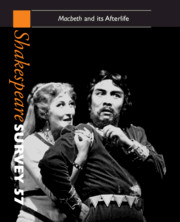Book contents
- Frontmatter
- Humane Statute and the Gentle Weal: Historical Reading and Historical Allegory
- Macbeth’s Knowledge
- ‘The Grace of Grace’ and Double-Talk in Macbeth
- Remind Me: How Many Children Had Lady Macbeth?
- Taking Macbeth out of Himself: Davenant, Garrick, Schiller and Verdi
- ‘Two truths are told’: Afterlives and Histories of Macbeths
- Doing All That Becomes a Man: The Reception and Afterlife of the Macbeth Actor, 1744–1889
- Macbeth and Kierkegaard
- Monsieur Macbeth: from Jarry to Ionesco
- The Politics of Sleepwalking: American Lady Macbeths
- Macbird! and Macbeth: Topicality and Imitation in Barbara Garson’s Satirical Pastiche
- Mick Jagger Macbeth
- ‘The Zulu Macbeth’: The Value of an ‘African Shakespeare’
- ‘A Drum, a Drum – Macbeth doth come’: When Birnam Wood moved to China
- The Banquet of Scotland (PA)
- Scoff power in Love’s Labour’s Lost and the Inns of Court: Language in Context
- Mercury, Boy Yet and the ‘Harsh’ Words of Love’s Labour’s Lost
- Shakespeare, Sir Thomas More and Asylum Seekers
- Hal as Self-Styled Redeemer: The Harrowing of Hell and Henry IV Part 1
- Mr Hamlet of Broadway
- Shakespeare Performances in England, 2003
- Professional Shakespeare Productions in the British Isles January–December 2002
- The Year's Contributions to Shakespearian Study 1 Critical Studies
- 2 Shakespeare in Performance
- 3 Editions and Textual Studies
- Books Received
- Index
The Year's Contributions to Shakespearian Study 1 - Critical Studies
Published online by Cambridge University Press: 28 March 2007
- Frontmatter
- Humane Statute and the Gentle Weal: Historical Reading and Historical Allegory
- Macbeth’s Knowledge
- ‘The Grace of Grace’ and Double-Talk in Macbeth
- Remind Me: How Many Children Had Lady Macbeth?
- Taking Macbeth out of Himself: Davenant, Garrick, Schiller and Verdi
- ‘Two truths are told’: Afterlives and Histories of Macbeths
- Doing All That Becomes a Man: The Reception and Afterlife of the Macbeth Actor, 1744–1889
- Macbeth and Kierkegaard
- Monsieur Macbeth: from Jarry to Ionesco
- The Politics of Sleepwalking: American Lady Macbeths
- Macbird! and Macbeth: Topicality and Imitation in Barbara Garson’s Satirical Pastiche
- Mick Jagger Macbeth
- ‘The Zulu Macbeth’: The Value of an ‘African Shakespeare’
- ‘A Drum, a Drum – Macbeth doth come’: When Birnam Wood moved to China
- The Banquet of Scotland (PA)
- Scoff power in Love’s Labour’s Lost and the Inns of Court: Language in Context
- Mercury, Boy Yet and the ‘Harsh’ Words of Love’s Labour’s Lost
- Shakespeare, Sir Thomas More and Asylum Seekers
- Hal as Self-Styled Redeemer: The Harrowing of Hell and Henry IV Part 1
- Mr Hamlet of Broadway
- Shakespeare Performances in England, 2003
- Professional Shakespeare Productions in the British Isles January–December 2002
- The Year's Contributions to Shakespearian Study 1 Critical Studies
- 2 Shakespeare in Performance
- 3 Editions and Textual Studies
- Books Received
- Index
Summary
Last year I began with the crisis in publishing, and the difficulties young scholars now face with first monographs. Nothing suggests that the situation has eased; rather, the monograph itself is threatened. The consequences can be severe in academic cultures which require the production – I am choosing my words with care – of extended, continuous arguments between hard covers, not once but repeatedly. As publishers change their lists in the direction of ‘Companions’ and ‘Guides’, ‘Topics’ and ‘Accents’, and other collections targeted at student markets, good new work appears increasingly in formats once disdained by committees reviewing dossiers for appointment, tenure, promotion, merit awards, all the armature of careers. Increasingly, the wider publication in journals and reviews becomes necessary, and no longer simply to try out ideas which will be discussed and modified later, or which may not contribute to a larger argument. The Net offers potential alternatives, but resistance to Net publication is no doubt in part fuelled by the wild freedom which has given a disreputable glow to much that happens there. The uploading of journals is to be welcomed – for much of the wide world of scholarship, it revolutionizes access, although the prices of subscriptions remain a problem. A free site, such as Shaksper (www.shaksper.net, edited by Professor Hardy M. Cook), has the advantages and disadvantages typical of all discussion groups: above all, for better or for worse, quantity. The phenomenon is hardly restricted to the Net: the proliferation of journals, and of the ephemeral appearance of conference papers, raises questions about just how much the world of scholarship can sustain.
- Type
- Chapter
- Information
- Shakespeare SurveyAn Annual Survey of Shakespeare Studies and Production, pp. 299 - 325Publisher: Cambridge University PressPrint publication year: 2004

